Unit 1 Lights, camera, action! Welcome to the unit & Reading (教学课件)-高中英语译林版(2020)必修第二册(共42页PPT)
文档属性
| 名称 | Unit 1 Lights, camera, action! Welcome to the unit & Reading (教学课件)-高中英语译林版(2020)必修第二册(共42页PPT) | 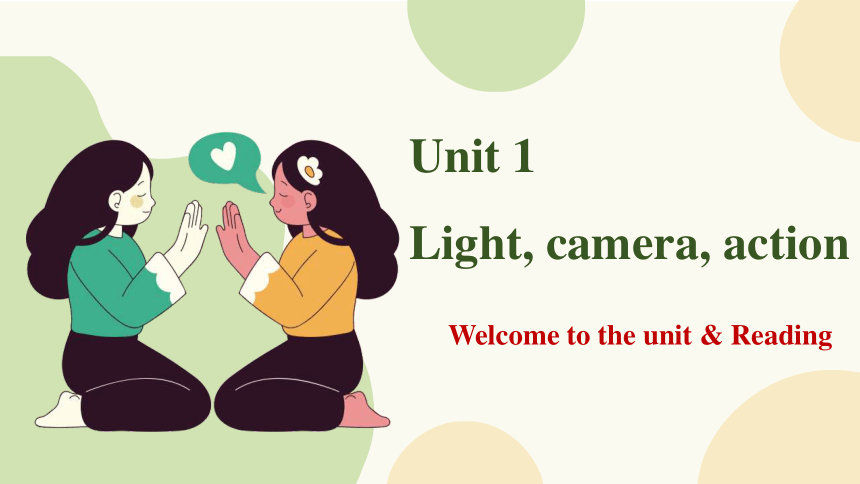 | |
| 格式 | pptx | ||
| 文件大小 | 97.7MB | ||
| 资源类型 | 试卷 | ||
| 版本资源 | 牛津译林版(2019) | ||
| 科目 | 英语 | ||
| 更新时间 | 2025-07-28 09:30:33 | ||
图片预览


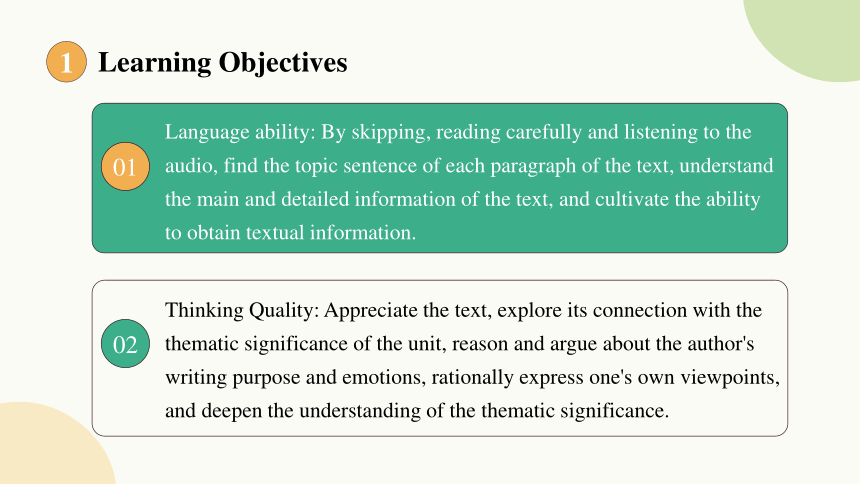
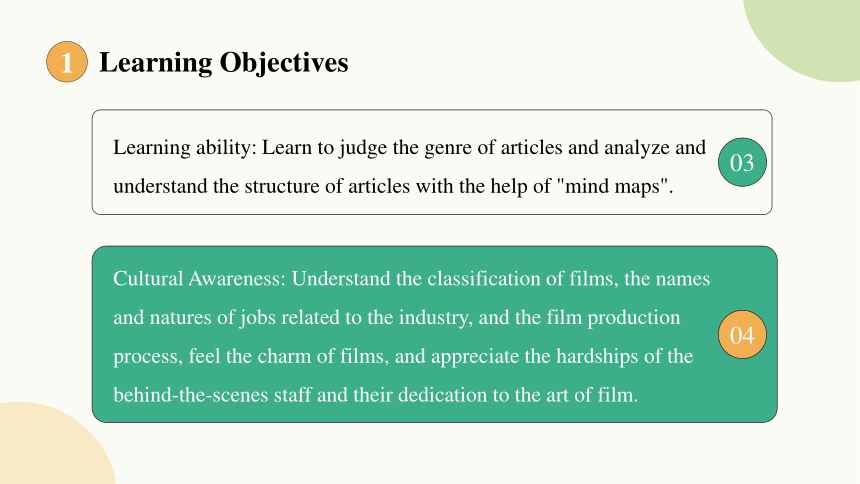

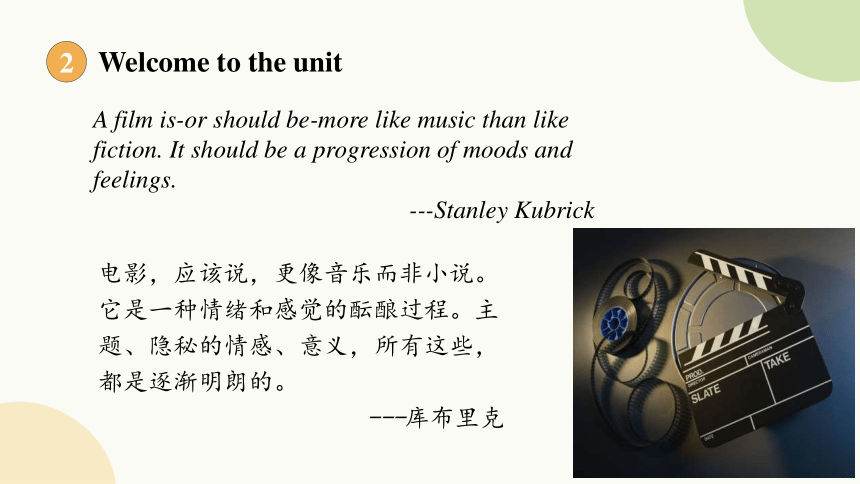
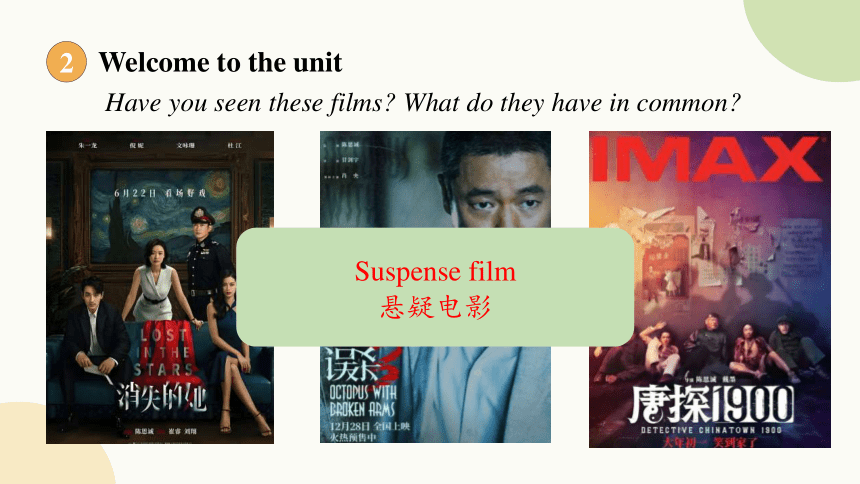
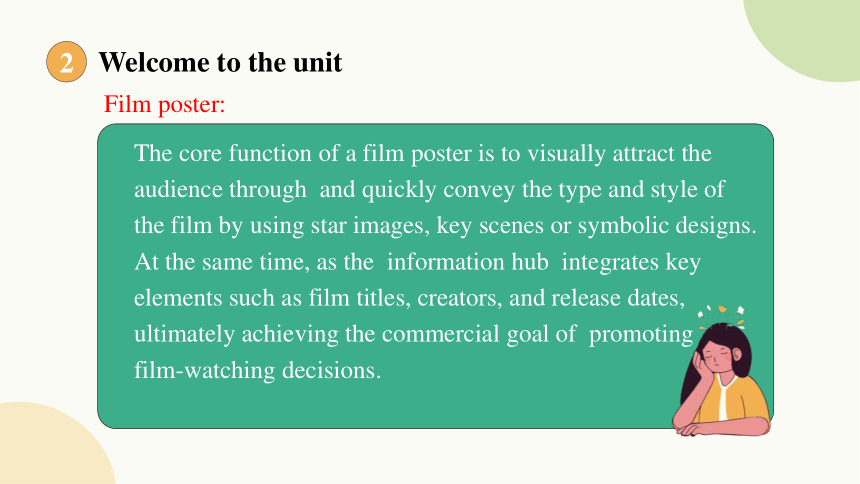
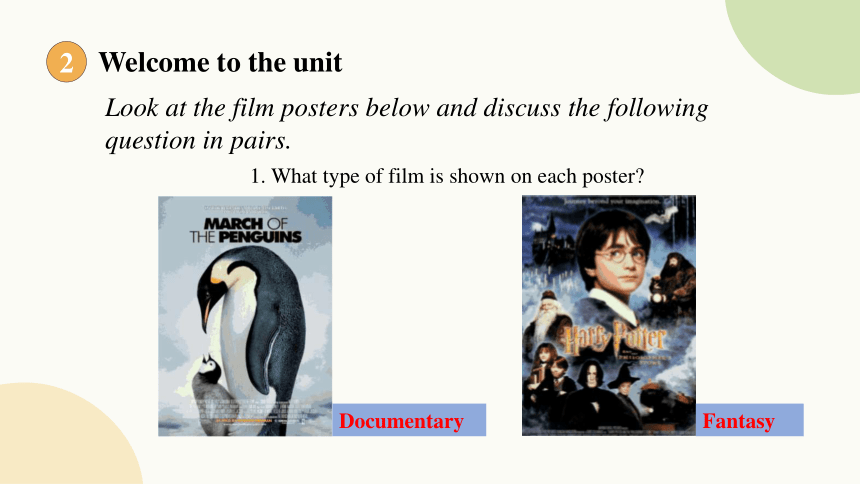
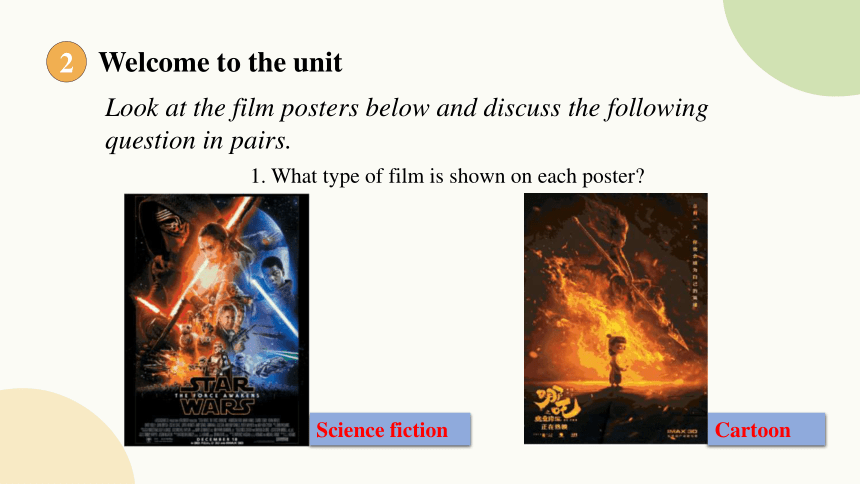
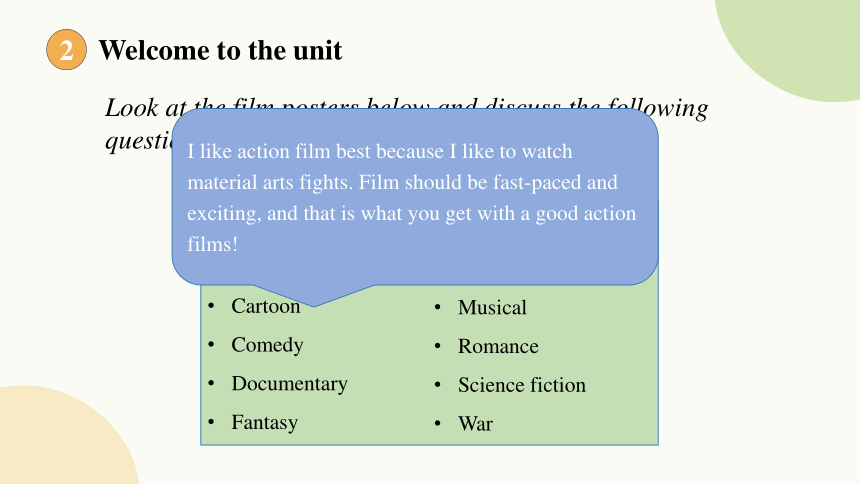
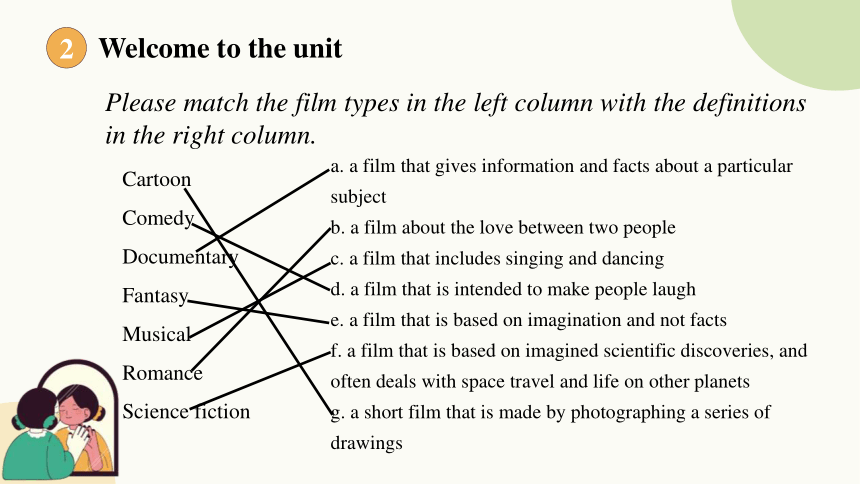
文档简介
(共41张PPT)
Unit 1
Light, camera, action
Welcome to the unit & Reading
Learning Objectives
1
1
Learning Objectives
01
02
Thinking Quality: Appreciate the text, explore its connection with the thematic significance of the unit, reason and argue about the author's writing purpose and emotions, rationally express one's own viewpoints, and deepen the understanding of the thematic significance.
Language ability: By skipping, reading carefully and listening to the audio, find the topic sentence of each paragraph of the text, understand the main and detailed information of the text, and cultivate the ability to obtain textual information.
1
Learning Objectives
03
Learning ability: Learn to judge the genre of articles and analyze and understand the structure of articles with the help of "mind maps".
04
Cultural Awareness: Understand the classification of films, the names and natures of jobs related to the industry, and the film production process, feel the charm of films, and appreciate the hardships of the behind-the-scenes staff and their dedication to the art of film.
Welcome to the unit
2
2
Welcome to the unit
A film is-or should be-more like music than like fiction. It should be a progression of moods and feelings.
---Stanley Kubrick
电影,应该说,更像音乐而非小说。它是一种情绪和感觉的酝酿过程。主题、隐秘的情感、意义,所有这些,都是逐渐明朗的。
---库布里克
2
Welcome to the unit
Have you seen these films What do they have in common
Suspense film
悬疑电影
The core function of a film poster is to visually attract the audience through and quickly convey the type and style of the film by using star images, key scenes or symbolic designs. At the same time, as the information hub integrates key elements such as film titles, creators, and release dates, ultimately achieving the commercial goal of promoting
film-watching decisions.
2
Welcome to the unit
Film poster:
2
Welcome to the unit
Look at the film posters below and discuss the following question in pairs.
1. What type of film is shown on each poster
Documentary
Fantasy
2
Welcome to the unit
Look at the film posters below and discuss the following question in pairs.
1. What type of film is shown on each poster
Science fiction
Cartoon
2
Welcome to the unit
Look at the film posters below and discuss the following question in pairs.
2. Which film type do you like best Why
Below is a list of some popular film types:
Action
Cartoon
Comedy
Documentary
Fantasy
Horror
Musical
Romance
Science fiction
War
I like action film best because I like to watch material arts fights. Film should be fast-paced and exciting, and that is what you get with a good action films!
2
Welcome to the unit
Please match the film types in the left column with the definitions in the right column.
Cartoon
Comedy
Documentary Fantasy
Musical
Romance
Science fiction
a. a film that gives information and facts about a particular subject
b. a film about the love between two people
c. a film that includes singing and dancing
d. a film that is intended to make people laugh
e. a film that is based on imagination and not facts
f. a film that is based on imagined scientific discoveries, and often deals with space travel and life on other planets
g. a short film that is made by photographing a series of drawings
Pair work
What do you think are the benefits of seeing films
2
Welcome to the unit
There are several benefits of seeing films. As a means of entertainment or amusement, seeing films can help us relax, especially after a long time of work or study.
Furthermore, focusing on some social issues, some films are very thought-provoking, which helps broaden our horizons and cultivate our character.
Pair work
Who is your favourite film star Why do you like him or her Who is your favourite director Why do you like him or her
2
Welcome to the unit
My favourite film star is Leonardo DiCaprio, who is an Academy Award-winning actor and a five-time Academy Award nominee. He is very handsome and has given brilliant performances in all his films. The film, The Great Gatsby, in which he stars, is my favourite. My favourite director is Zhang Yimou, a world-famous film director, screenwriter, and producer. It is thanks to his efforts that many people have become more aware of Chinese-made films.
Reading
3
3
Reading
Many different elements go into making a film. The lecture below was given by a film critic at the school Film Festival. Before you read the lecture transcript, think about the following questions:
1. What elements of a film can you think of
The screenplay, directing, acting, lighting, music, dubbing and recording, special effects, editing, etc.
3
Reading
Many different elements go into making a film. The lecture below was given by a film critic at the school Film Festival. Before you read the lecture transcript, think about the following questions:
2. Which element do you think is the most important in making a successful film
I think the music is the most important element. It can tell us how the people in the film feel and create a certain kind of atmosphere. The film would be boring without it.
Match the paragraphs with the main ideas.
3
Reading
Para.2
Para.3
Para.5
Para.1
Para.4
Some aspects of film-making behind the scenes require a lot of hard work.
I'd like to draw your attention to an important factor of a film—sound effects.
Another aspect I attach great importance to is visual special effects.
Props also contribute to a film's success.
My lecture today may not be able to do justice to all the work people have done behind the scenes.
3
Reading
Read the lecture transcript and complete the chart below with the main idea of each paragraph.
Introduction (Para. 1): Some aspects of film-making behind the scenes require a
lot of hard work.
Main body:
Aspect 1 (Para. 2): (1)
Aspect 2 (Para. 3): (2)
Aspect 3 (Para. 4): (3)
Conclusion (Para. 5): (4)
Sound effects
Visual special effects
Props
Think of and appreciate the work done behind the scenes.
3
Reading
Read the lecture transcript again carefully and complete the table below.
Main points Examples
Many sound effects might not be made in the way you would expect. (1)
(2) The Quidditch scenes in the Harry Potter films were made with the actors jumping in front of a green screen.
The sounds of a baby elephant, a tiger and other animals were mixed by a computer to make a dinosaur roar in Jurassic Park. The sound of the doors opening was made by pulling a sheet of paper out of an envelope in the Star Trek films.
Scenes requiring CGI are filmed in front of a green screen.
3
Reading
Read the lecture transcript again carefully and complete the table below.
Main points Examples
The aid of computers isn’t always preferred. (3)
Props contribute to a film’s success. (4)
The director of The Lord of the Rings films used clever camera angles to make characters seem bigger or smaller than they really were.
Director James Cameron spent six months looking at and revising plans of the Titanic in order to build a full-sized model for his 1997 film. It took 500 workers 100 days to build the fine model.
3
Reading
Read the passage carefully and choose the best answer.
1. In Jurassic Park, how did the film-maker make a dinosaur roar
A. He used the computer to mix the sounds of different animals.
B. He mixed the sounds of an elephant and a tiger together.
C. He used the computer to record the sounds of different animals.
D. He recorded the real sound of a tiger.
2. How did Peter Jackson make characters seem bigger or smaller than they really were
A. By using stunts(特技表演).
B. By using correct props.
C. With the aid of computers.
D. By using clever camera angles.
3
Reading
Read the passage carefully and choose the best answer.
3. What effort did James Cameron make to contribute to the Titanic's success
A. He spent six months revising plans to build a middle-sized model for the film.
B. He talked to historians and even went down to the bottom of the Atlantic Ocean.
C. He spent 100 days in building the fine model.
D. He spent 100 days in building thousands of props.
4. What's the passage mainly about
A. How to make a film.
B. The development of film-making.
C. The brief introduction to some aspects of film-making.
D. What film-making will look like in the future.
1.Why do you think the film critic asks a question at the beginning of his lecture
3
Reading
2.What conclusion can you draw from the lecture
Film-making involves a lot of hard work behind the scenes.
3.Do you support the use of CGI in films Why or why not
No. I don't really like to see too much CGI in films. I think having a good storyline is the most important thing for a film, and sometimes technology can get in the way.
Pair work
To attract the audience's attention, to make the audience think and to connect the lecture's topic with their background knowledge.
3
Reading
Simon is talking about his favourite film at the school Film plete what he says with the correct forms of the words and phrase in the box below.
prefer factor aid actually
enable approach frequently be familiar with
With the __________ of the computer, scenes like this could have been made in the studio. However, the film's director, Ang Lee, __________ to have actors perform on location. He believed this __________ to film-making would create a “human connection” which could not be achieved with CGI special effects.
In addition to the amazing martial arts, the film also took advantage of China's beautiful mountains, forests and deserts. __________, it was shot indifferent locations all around the country. All these_______ contributed to the film's success.
approach
factors
preferred
aid
Actually
3
Reading
Simon is talking about his favourite film at the school Film plete what he says with the correct forms of the words and phrase in the box below.
prefer factor aid actually
enable approach frequently be familiar with
To the __________ asked question, “What's your favourite film ”, my answer is Crouching Tiger, Hidden Dragon. It has won many awards, including an Academy Award for Best Foreign Language Film. It has also __________ Western audiences to have a better understanding of Chinese culture.
You must _________________ the exciting fighting scene on top of a bamboo forest in Crouching Tiger, Hidden Dragon.
enabled
frequently
be familiar with
3
Reading
There are a lot of people working in the film industry. Fill in the flow chart below with different film-related jobs from the box. Then add more film-related jobs to the flow chart.
actor cameraman costume designer director film critic make-up artist production designer set designer
sound engineer special effects engineer stuntman voice actor
Preparation
costume designer,
production designer,
set designer
scriptwriter
Shooting
actor, cameraman,
make-up artist,
stuntman
lighting engineer
3
Reading
There are a lot of people working in the film industry. Fill in the flow chart below with different film-related jobs from the box. Then add more film-related jobs to the flow chart.
actor cameraman costume designer director film critic make-up artist production designer set designer
sound engineer special effects engineer stuntman voice actor
Post-production
sound engineer,
special effects engineer,
voice actor
film cutter
Release
film critic
distributor
producer
director
3
Reading
The film critic uses a metaphor in his lecture to describe the fact that a lot of work is done behind the scenes in film-making. Find the metaphor in the lecture and write a metaphor of your own to describe the film-making process.
A good film-making team is a sophisticated machine. There are many different parts and they all need to work together smoothly for the film to be a success. Even the parts you cannot see are important in some way.
3
Reading
Learn this:
A metaphor compares one thing to another without using "as" or "like".
It draws the reader's attention to the similarities between two things. This way, unfamiliar things can be explained with something people are more familiar with.
Vocabulary
4
4
Vocabulary
1. adj.熟悉的,常见的
2. n.信封
3. n./vt. & vi.帮助;援助
4. n.方法;接近,靠近 vt.接近,靠近;处理
5. vt.保证,确保
6. n.讲座,演讲;教训,训斥 vi.开讲座,讲课 vt.指责,
7. n.公平,公正;公道,合理
8. n.奖,奖品,奖金 vt.授予,给予
familiar
envelope
aid
approach
ensure
lecture
justice
award
4
Vocabulary
1.fiction n.
2.factor n.
3.sheet n.
4.visual adj.
5.studio n.
6.angle n.
7.Atlantic adj.
8.ocean n.
9.audience n.
10.location n.
11.desert n.
小说;虚构的故事
因素,要素
一张(纸);床单,被单,薄片
视力的,视觉的
电影摄影棚;录音室
角度;立场,观点
大西洋的
大洋,海洋
观众,听众
外景拍摄地;地方,地点
沙漠,荒漠
4
Vocabulary
1. 在后台,在幕后
2. 大量的
3. 对……熟悉
4. 认为……有重要意义;高度重视
5. 有助于;捐献;促成
6. 更不用说,且不说
7. 恰当处理(某人或某事);
公平对待(某人或某事),给予公正的评价
8. 除……以外(还)
9. 想到某事
10. 利用
behind the scenes
a huge amount of
be familiar with
attach great importance to
contribute to
not to mention
do justice to
in addition to
spare a thought for sth
take advantage of
Exercise
5
5
Exercise
1.type n.类型,种类 vt. & vi.打字→________ adj.典型的;特有的
2.comedy n.喜剧片,喜剧→__________ n.喜剧演员
3.fantasy n.幻想作品;幻想,想象→__________ adj.奇异的;空想的;极出色的;不可思议的
4.horror n.恐怖电影(或故事等);震惊,恐惧→__________ adj.恐怖的;极坏的→__________ adv.可怕地;非常地
5.romance n.爱情故事;浪漫史;爱情→__________ adj.浪漫的;多情的;空想的→__________ adv.浪漫地;不切实际地→____________ n.浪漫主义;浪漫精神
6.actually adv.实际上,事实上→_________ adj.实际的;真实的
typical
comedian
fantastic
horrible
horribly
romantic
romantically
romanticism
actual
5
Exercise
1.—You seem to be familiar ________ the town.
— Yes, I studied here for 4 years. It's great to be back again.
2. With more importance attached ______ traditional culture these years, hanfu has become increasingly popular.
3. "Thank you so much for coming ______ my aid," said Polly in relief.
4. I prefer ________ (stay) at home all night to make up the lost time rather than go to the movies.
5. They came up with several approaches to ________ (solve) the problem, but some were not practical.
with
to
to
to stay
solving
5
Exercise
6. In spite of all the problems, several of the players produced excellent __________ (perform).
7. In my opinion,it is not the failure itself but the way ________ we deal with the failure that matters.
8. In our childhood, we were often reminded to pay attention ________ our table manners.
9. As I was about to give up hope, a man ________ (drive) an old car came to my help.
10. Festivals are becoming more and more commercial (商业化), with businesses ________ (take) advantage of the celebrations.
performance
that
to
driving
taking
Homework
6
1. Review the words and phrases of this lesson
2. Preview the grammar knowledge for the next class
See you next class!
Unit 1
Light, camera, action
Welcome to the unit & Reading
Learning Objectives
1
1
Learning Objectives
01
02
Thinking Quality: Appreciate the text, explore its connection with the thematic significance of the unit, reason and argue about the author's writing purpose and emotions, rationally express one's own viewpoints, and deepen the understanding of the thematic significance.
Language ability: By skipping, reading carefully and listening to the audio, find the topic sentence of each paragraph of the text, understand the main and detailed information of the text, and cultivate the ability to obtain textual information.
1
Learning Objectives
03
Learning ability: Learn to judge the genre of articles and analyze and understand the structure of articles with the help of "mind maps".
04
Cultural Awareness: Understand the classification of films, the names and natures of jobs related to the industry, and the film production process, feel the charm of films, and appreciate the hardships of the behind-the-scenes staff and their dedication to the art of film.
Welcome to the unit
2
2
Welcome to the unit
A film is-or should be-more like music than like fiction. It should be a progression of moods and feelings.
---Stanley Kubrick
电影,应该说,更像音乐而非小说。它是一种情绪和感觉的酝酿过程。主题、隐秘的情感、意义,所有这些,都是逐渐明朗的。
---库布里克
2
Welcome to the unit
Have you seen these films What do they have in common
Suspense film
悬疑电影
The core function of a film poster is to visually attract the audience through and quickly convey the type and style of the film by using star images, key scenes or symbolic designs. At the same time, as the information hub integrates key elements such as film titles, creators, and release dates, ultimately achieving the commercial goal of promoting
film-watching decisions.
2
Welcome to the unit
Film poster:
2
Welcome to the unit
Look at the film posters below and discuss the following question in pairs.
1. What type of film is shown on each poster
Documentary
Fantasy
2
Welcome to the unit
Look at the film posters below and discuss the following question in pairs.
1. What type of film is shown on each poster
Science fiction
Cartoon
2
Welcome to the unit
Look at the film posters below and discuss the following question in pairs.
2. Which film type do you like best Why
Below is a list of some popular film types:
Action
Cartoon
Comedy
Documentary
Fantasy
Horror
Musical
Romance
Science fiction
War
I like action film best because I like to watch material arts fights. Film should be fast-paced and exciting, and that is what you get with a good action films!
2
Welcome to the unit
Please match the film types in the left column with the definitions in the right column.
Cartoon
Comedy
Documentary Fantasy
Musical
Romance
Science fiction
a. a film that gives information and facts about a particular subject
b. a film about the love between two people
c. a film that includes singing and dancing
d. a film that is intended to make people laugh
e. a film that is based on imagination and not facts
f. a film that is based on imagined scientific discoveries, and often deals with space travel and life on other planets
g. a short film that is made by photographing a series of drawings
Pair work
What do you think are the benefits of seeing films
2
Welcome to the unit
There are several benefits of seeing films. As a means of entertainment or amusement, seeing films can help us relax, especially after a long time of work or study.
Furthermore, focusing on some social issues, some films are very thought-provoking, which helps broaden our horizons and cultivate our character.
Pair work
Who is your favourite film star Why do you like him or her Who is your favourite director Why do you like him or her
2
Welcome to the unit
My favourite film star is Leonardo DiCaprio, who is an Academy Award-winning actor and a five-time Academy Award nominee. He is very handsome and has given brilliant performances in all his films. The film, The Great Gatsby, in which he stars, is my favourite. My favourite director is Zhang Yimou, a world-famous film director, screenwriter, and producer. It is thanks to his efforts that many people have become more aware of Chinese-made films.
Reading
3
3
Reading
Many different elements go into making a film. The lecture below was given by a film critic at the school Film Festival. Before you read the lecture transcript, think about the following questions:
1. What elements of a film can you think of
The screenplay, directing, acting, lighting, music, dubbing and recording, special effects, editing, etc.
3
Reading
Many different elements go into making a film. The lecture below was given by a film critic at the school Film Festival. Before you read the lecture transcript, think about the following questions:
2. Which element do you think is the most important in making a successful film
I think the music is the most important element. It can tell us how the people in the film feel and create a certain kind of atmosphere. The film would be boring without it.
Match the paragraphs with the main ideas.
3
Reading
Para.2
Para.3
Para.5
Para.1
Para.4
Some aspects of film-making behind the scenes require a lot of hard work.
I'd like to draw your attention to an important factor of a film—sound effects.
Another aspect I attach great importance to is visual special effects.
Props also contribute to a film's success.
My lecture today may not be able to do justice to all the work people have done behind the scenes.
3
Reading
Read the lecture transcript and complete the chart below with the main idea of each paragraph.
Introduction (Para. 1): Some aspects of film-making behind the scenes require a
lot of hard work.
Main body:
Aspect 1 (Para. 2): (1)
Aspect 2 (Para. 3): (2)
Aspect 3 (Para. 4): (3)
Conclusion (Para. 5): (4)
Sound effects
Visual special effects
Props
Think of and appreciate the work done behind the scenes.
3
Reading
Read the lecture transcript again carefully and complete the table below.
Main points Examples
Many sound effects might not be made in the way you would expect. (1)
(2) The Quidditch scenes in the Harry Potter films were made with the actors jumping in front of a green screen.
The sounds of a baby elephant, a tiger and other animals were mixed by a computer to make a dinosaur roar in Jurassic Park. The sound of the doors opening was made by pulling a sheet of paper out of an envelope in the Star Trek films.
Scenes requiring CGI are filmed in front of a green screen.
3
Reading
Read the lecture transcript again carefully and complete the table below.
Main points Examples
The aid of computers isn’t always preferred. (3)
Props contribute to a film’s success. (4)
The director of The Lord of the Rings films used clever camera angles to make characters seem bigger or smaller than they really were.
Director James Cameron spent six months looking at and revising plans of the Titanic in order to build a full-sized model for his 1997 film. It took 500 workers 100 days to build the fine model.
3
Reading
Read the passage carefully and choose the best answer.
1. In Jurassic Park, how did the film-maker make a dinosaur roar
A. He used the computer to mix the sounds of different animals.
B. He mixed the sounds of an elephant and a tiger together.
C. He used the computer to record the sounds of different animals.
D. He recorded the real sound of a tiger.
2. How did Peter Jackson make characters seem bigger or smaller than they really were
A. By using stunts(特技表演).
B. By using correct props.
C. With the aid of computers.
D. By using clever camera angles.
3
Reading
Read the passage carefully and choose the best answer.
3. What effort did James Cameron make to contribute to the Titanic's success
A. He spent six months revising plans to build a middle-sized model for the film.
B. He talked to historians and even went down to the bottom of the Atlantic Ocean.
C. He spent 100 days in building the fine model.
D. He spent 100 days in building thousands of props.
4. What's the passage mainly about
A. How to make a film.
B. The development of film-making.
C. The brief introduction to some aspects of film-making.
D. What film-making will look like in the future.
1.Why do you think the film critic asks a question at the beginning of his lecture
3
Reading
2.What conclusion can you draw from the lecture
Film-making involves a lot of hard work behind the scenes.
3.Do you support the use of CGI in films Why or why not
No. I don't really like to see too much CGI in films. I think having a good storyline is the most important thing for a film, and sometimes technology can get in the way.
Pair work
To attract the audience's attention, to make the audience think and to connect the lecture's topic with their background knowledge.
3
Reading
Simon is talking about his favourite film at the school Film plete what he says with the correct forms of the words and phrase in the box below.
prefer factor aid actually
enable approach frequently be familiar with
With the __________ of the computer, scenes like this could have been made in the studio. However, the film's director, Ang Lee, __________ to have actors perform on location. He believed this __________ to film-making would create a “human connection” which could not be achieved with CGI special effects.
In addition to the amazing martial arts, the film also took advantage of China's beautiful mountains, forests and deserts. __________, it was shot indifferent locations all around the country. All these_______ contributed to the film's success.
approach
factors
preferred
aid
Actually
3
Reading
Simon is talking about his favourite film at the school Film plete what he says with the correct forms of the words and phrase in the box below.
prefer factor aid actually
enable approach frequently be familiar with
To the __________ asked question, “What's your favourite film ”, my answer is Crouching Tiger, Hidden Dragon. It has won many awards, including an Academy Award for Best Foreign Language Film. It has also __________ Western audiences to have a better understanding of Chinese culture.
You must _________________ the exciting fighting scene on top of a bamboo forest in Crouching Tiger, Hidden Dragon.
enabled
frequently
be familiar with
3
Reading
There are a lot of people working in the film industry. Fill in the flow chart below with different film-related jobs from the box. Then add more film-related jobs to the flow chart.
actor cameraman costume designer director film critic make-up artist production designer set designer
sound engineer special effects engineer stuntman voice actor
Preparation
costume designer,
production designer,
set designer
scriptwriter
Shooting
actor, cameraman,
make-up artist,
stuntman
lighting engineer
3
Reading
There are a lot of people working in the film industry. Fill in the flow chart below with different film-related jobs from the box. Then add more film-related jobs to the flow chart.
actor cameraman costume designer director film critic make-up artist production designer set designer
sound engineer special effects engineer stuntman voice actor
Post-production
sound engineer,
special effects engineer,
voice actor
film cutter
Release
film critic
distributor
producer
director
3
Reading
The film critic uses a metaphor in his lecture to describe the fact that a lot of work is done behind the scenes in film-making. Find the metaphor in the lecture and write a metaphor of your own to describe the film-making process.
A good film-making team is a sophisticated machine. There are many different parts and they all need to work together smoothly for the film to be a success. Even the parts you cannot see are important in some way.
3
Reading
Learn this:
A metaphor compares one thing to another without using "as" or "like".
It draws the reader's attention to the similarities between two things. This way, unfamiliar things can be explained with something people are more familiar with.
Vocabulary
4
4
Vocabulary
1. adj.熟悉的,常见的
2. n.信封
3. n./vt. & vi.帮助;援助
4. n.方法;接近,靠近 vt.接近,靠近;处理
5. vt.保证,确保
6. n.讲座,演讲;教训,训斥 vi.开讲座,讲课 vt.指责,
7. n.公平,公正;公道,合理
8. n.奖,奖品,奖金 vt.授予,给予
familiar
envelope
aid
approach
ensure
lecture
justice
award
4
Vocabulary
1.fiction n.
2.factor n.
3.sheet n.
4.visual adj.
5.studio n.
6.angle n.
7.Atlantic adj.
8.ocean n.
9.audience n.
10.location n.
11.desert n.
小说;虚构的故事
因素,要素
一张(纸);床单,被单,薄片
视力的,视觉的
电影摄影棚;录音室
角度;立场,观点
大西洋的
大洋,海洋
观众,听众
外景拍摄地;地方,地点
沙漠,荒漠
4
Vocabulary
1. 在后台,在幕后
2. 大量的
3. 对……熟悉
4. 认为……有重要意义;高度重视
5. 有助于;捐献;促成
6. 更不用说,且不说
7. 恰当处理(某人或某事);
公平对待(某人或某事),给予公正的评价
8. 除……以外(还)
9. 想到某事
10. 利用
behind the scenes
a huge amount of
be familiar with
attach great importance to
contribute to
not to mention
do justice to
in addition to
spare a thought for sth
take advantage of
Exercise
5
5
Exercise
1.type n.类型,种类 vt. & vi.打字→________ adj.典型的;特有的
2.comedy n.喜剧片,喜剧→__________ n.喜剧演员
3.fantasy n.幻想作品;幻想,想象→__________ adj.奇异的;空想的;极出色的;不可思议的
4.horror n.恐怖电影(或故事等);震惊,恐惧→__________ adj.恐怖的;极坏的→__________ adv.可怕地;非常地
5.romance n.爱情故事;浪漫史;爱情→__________ adj.浪漫的;多情的;空想的→__________ adv.浪漫地;不切实际地→____________ n.浪漫主义;浪漫精神
6.actually adv.实际上,事实上→_________ adj.实际的;真实的
typical
comedian
fantastic
horrible
horribly
romantic
romantically
romanticism
actual
5
Exercise
1.—You seem to be familiar ________ the town.
— Yes, I studied here for 4 years. It's great to be back again.
2. With more importance attached ______ traditional culture these years, hanfu has become increasingly popular.
3. "Thank you so much for coming ______ my aid," said Polly in relief.
4. I prefer ________ (stay) at home all night to make up the lost time rather than go to the movies.
5. They came up with several approaches to ________ (solve) the problem, but some were not practical.
with
to
to
to stay
solving
5
Exercise
6. In spite of all the problems, several of the players produced excellent __________ (perform).
7. In my opinion,it is not the failure itself but the way ________ we deal with the failure that matters.
8. In our childhood, we were often reminded to pay attention ________ our table manners.
9. As I was about to give up hope, a man ________ (drive) an old car came to my help.
10. Festivals are becoming more and more commercial (商业化), with businesses ________ (take) advantage of the celebrations.
performance
that
to
driving
taking
Homework
6
1. Review the words and phrases of this lesson
2. Preview the grammar knowledge for the next class
See you next class!
